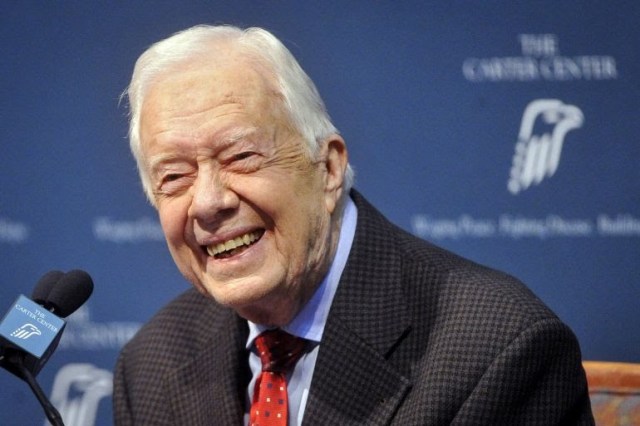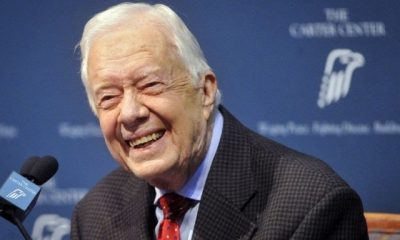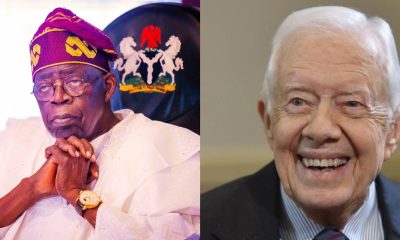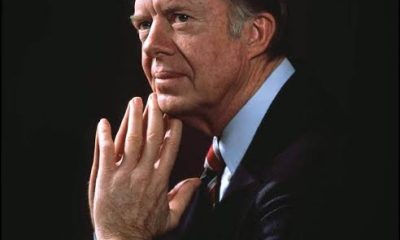More News
Jimmy Carter: Highlights In Life Of Longest Living US President

Jimmy Carter, the 39th President of the United States, passed away on Sunday at the age of 100, leaving behind a legacy shaped by both his tumultuous presidency and his groundbreaking post-presidential contributions.
From brokering peace deals to advocating for human rights, Jimmy Carter’s journey was marked by triumphs, challenges, and an unwavering commitment to service.
Here are key moments that defined the life of the former U.S. leader:
The Panama Canal Decision
In one of his most controversial moves, Carter signed treaties in 1977 to transfer control of the Panama Canal to Panama by 1999. Initially ridiculed for the decision, which critics saw as a surrender of American influence, Carter defended the move as a step toward fairness in international relations. Over time, history has validated the decision as a diplomatic success, fostering stability and enhancing Panama’s sovereignty. Reacting to Carter’s death, Panamanian President Jose Mulino praised him for helping Panama achieve “full sovereignty.”
Morality and Human Rights
Carter’s presidency sought to inject moral principles into U.S. foreign policy, moving away from the Cold War-era realpolitik. He placed human rights at the forefront, signing the International Covenant on Civil and Political Rights in 1977, a document eventually ratified by the U.S. in 1992. His vision was to shape a world rooted in economic well-being, social justice, and self-determination.
The Camp David Accords
One of Carter’s defining achievements came in 1978 when he brokered peace between Israel and Egypt. Hosting Israeli Prime Minister Menachem Begin and Egyptian President Anwar Sadat at Camp David, Carter’s mediation led to agreements that paved the way for a formal peace treaty in 1979. This historic accomplishment earned Carter the Nobel Peace Prize and solidified his reputation as a global peacemaker.
The ‘Crisis of Confidence’ Speech
In July 1979, facing plummeting approval ratings and economic woes, Carter addressed the nation in what became known as the “Crisis of Confidence” speech. While he sought to inspire Americans to confront a broader national malaise, the speech backfired, with critics labeling it a deflection of leadership responsibility. The fallout led to the resignation of five cabinet members and further weakened his presidency.
Iran Hostage Crisis
The Iran hostage crisis was a turning point in Carter’s presidency. From November 1979 to January 1981, over 50 Americans were held captive in Tehran. A failed rescue mission in April 1980, plagued by sandstorms and equipment malfunctions, resulted in the deaths of eight servicemen and sealed Carter’s political fate. The hostages were finally released on the day Ronald Reagan took office in January 1981, following Carter’s resounding defeat in the 1980 election.
Post-Presidency: The Carter Center
After leaving office, Carter dedicated his life to humanitarian efforts. In 1982, he established the Carter Center, focusing on conflict resolution, democracy promotion, and disease eradication. He became a global advocate for peace, supervising elections in countries like Haiti and East Timor and mediating in international disputes.
Membership in The Elders
Carter joined The Elders, a group of former world leaders founded by Nelson Mandela in 2007 to promote peace and human rights. Alongside figures like Archbishop Desmond Tutu and Kofi Annan, Carter championed global causes until his later years.
Legacy of Service
Though his presidency was marked by challenges, Carter is widely regarded as one of the most successful former U.S. presidents. His relentless commitment to human rights, peacebuilding, and humanitarian work has left an indelible mark on the world.
As the world mourns his passing, Jimmy Carter’s life stands as a testament to the enduring power of compassion, diplomacy, and service.
Send Us A Press Statement Advertise With Us Contact Us
And For More Nigerian News Visit GWG.NG







